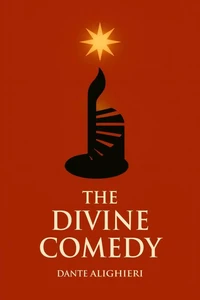The Divine Comedy describes Dante's journey through Hell (Inferno), Purgatory (Purgatorio), and Paradise (Paradiso), guided first by the Roman poet Virgil and then by Beatrice, the subject of his love and of another of his works, La Vita Nuova. While the vision of Hell, the Inferno, is vivid for modern readers, the theological niceties presented in the other books require a certain amount of patience and knowledge to appreciate.
Purgatorio, the most lyrical and human of the three, also has the most poets in it; Paradiso, the most heavily theological, has the most beautiful and ecstatic mystic passages in which Dante tries to describe what he confesses he is unable to convey (e.g., when Dante looks into the face of God: "all'alta fantasia qui mancò possa" - "at this high moment, ability failed my capacity to describe, " Paradiso, XXXIII, 142).
His glory, by whose might all things are mov'd,
Pierces the universe, and in one part
Sheds more resplendence, elsewhere less.
In heav'n,
That largeliest of his light partakes, was I,
Witness of things, which to relate again
Surpasseth power of him who comes from thence;
For that, so near approaching its desire
Our intellect is to such depth absorb'd,
That memory cannot follow. Nathless all,
That in my thoughts I of that sacred realm
Could store, shall now be matter of my song.
Benign Apollo! this last labour aid,
And make me such a vessel of thy worth,
As thy own laurel claims of me belov'd.
Thus far hath one of steep Parnassus' brows
Suffic'd me; henceforth there is need of both
For my remaining enterprise Do thou
Enter into my bosom, and there breathe
So, as when Marsyas by thy hand was dragg'd
Forth from his limbs unsheath'd.
O power divine!
If thou to me of shine impart so much,
That of that happy realm the shadow'd form
Trac'd in my thoughts I may set forth to view,
Thou shalt behold me of thy favour'd tree
Come to the foot, and crown myself with leaves;
For to that honour thou, and my high theme
Will fit me. If but seldom, mighty Sire!
To grace his triumph gathers thence a wreath
Caesar or bard (more shame for human wills
Deprav'd) joy to the Delphic god must spring
From the Pierian foliage, when one breast
Is with such thirst inspir'd.
From a small spark
Great flame hath risen: after me perchance
Others with better voice may pray, and gain
From the Cirrhaean city answer kind.
The Divine Comedy describes Dante's journey through Hell (Inferno), Purgatory (Purgatorio), and Paradise (Paradiso), guided first by the Roman poet Virgil and then by Beatrice, the subject of his love and of another of his works, La Vita Nuova. While the vision of Hell, the Inferno, is vivid for modern readers, the theological niceties presented in the other books require a certain amount of patience and knowledge to appreciate.
Purgatorio, the most lyrical and human of the three, also has the most poets in it; Paradiso, the most heavily theological, has the most beautiful and ecstatic mystic passages in which Dante tries to describe what he confesses he is unable to convey (e.g., when Dante looks into the face of God: "all'alta fantasia qui mancò possa" - "at this high moment, ability failed my capacity to describe, " Paradiso, XXXIII, 142).
His glory, by whose might all things are mov'd,
Pierces the universe, and in one part
Sheds more resplendence, elsewhere less.
In heav'n,
That largeliest of his light partakes, was I,
Witness of things, which to relate again
Surpasseth power of him who comes from thence;
For that, so near approaching its desire
Our intellect is to such depth absorb'd,
That memory cannot follow. Nathless all,
That in my thoughts I of that sacred realm
Could store, shall now be matter of my song.
Benign Apollo! this last labour aid,
And make me such a vessel of thy worth,
As thy own laurel claims of me belov'd.
Thus far hath one of steep Parnassus' brows
Suffic'd me; henceforth there is need of both
For my remaining enterprise Do thou
Enter into my bosom, and there breathe
So, as when Marsyas by thy hand was dragg'd
Forth from his limbs unsheath'd.
O power divine!
If thou to me of shine impart so much,
That of that happy realm the shadow'd form
Trac'd in my thoughts I may set forth to view,
Thou shalt behold me of thy favour'd tree
Come to the foot, and crown myself with leaves;
For to that honour thou, and my high theme
Will fit me. If but seldom, mighty Sire!
To grace his triumph gathers thence a wreath
Caesar or bard (more shame for human wills
Deprav'd) joy to the Delphic god must spring
From the Pierian foliage, when one breast
Is with such thirst inspir'd.
From a small spark
Great flame hath risen: after me perchance
Others with better voice may pray, and gain
From the Cirrhaean city answer kind.

 , qui est-ce ?
, qui est-ce ?